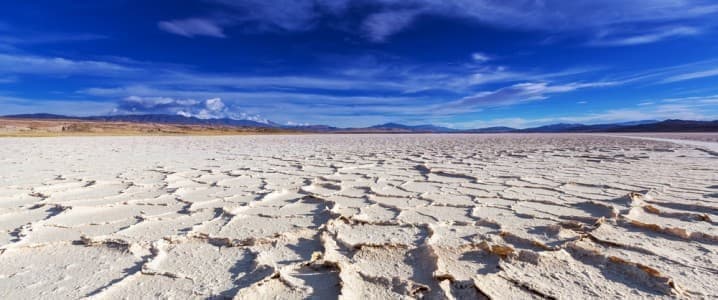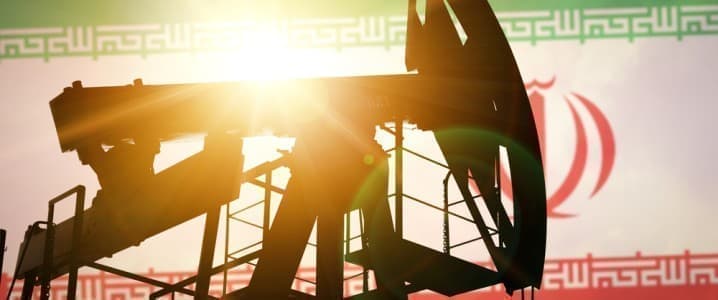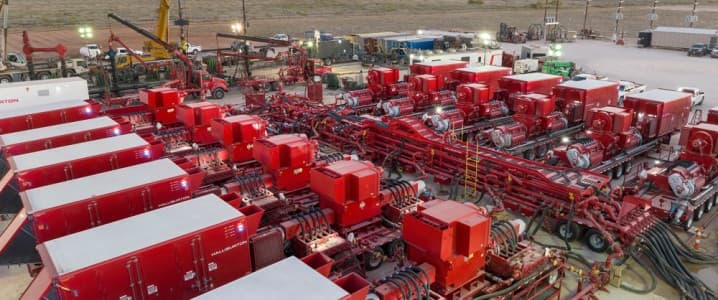Latest Commodity News

TotalEnergies’ $27 Billion Project Set to Transform Iraq's Oil Production
oilprice.com
2026-02-10 23:00:00 UTCProgress on TotalEnergies’ four-part project in Iraq is reported to be between 80% to 95% completed, as noted by the Oil Ministry. The projects include a significant rehabilitation of the Central Processing Facility, which aims to double oil production capacity from 60,000 to 120,000 barrels per day, as well as advancements on the Artawi-PS1 export pipeline. A senior source close to the Ministry revealed that TotalEnergies is ahead of schedule and effectively executing plans without much governmental interference, indicating potential for substantial growth in oil production.
The Common Seawater Supply Project (CSSP) is a crucial aspect of TotalEnergies’ strategy, aiming to enhance Iraq’s oil production by utilizing treated seawater to maintain reservoir pressure. This project could position Iraq among the world's top oil producers and initiate water supply to several oil fields. The plan outlines supplying around six million barrels per day of water to both established and new oil fields, with a need for considerable ongoing water injection to sustain future production targets.
The gas component of the deal is also vital, signifying Iraq's move to reduce dependency on Iranian gas imports, thereby weakening Iran's influence. Capturing and refining associated gas from various oil fields aims to significantly improve Iraq’s gas output, with a potential production of 300 million cubic feet per day, which could double after further development. Successful execution of this component may also support the long-delayed Nebras petrochemicals project, expected to generate significant profits for Iraq.
Looking ahead, if TotalEnergies maintains its current momentum, the $27 billion project could meet its timeline for completion around 2028. A critical factor will be TotalEnergies' ability to navigate political challenges and avoid interference from corrupt entities in the Iraqi establishment, with efforts already made to distance itself from the re-emerging Iraqi National Oil Company.

US Crude Oil Inventories Surge Amid Declining Production
oilprice.com
2026-02-10 22:01:08 UTCThe American Petroleum Institute (API) reported a significant increase in crude oil inventories in the United States, with an addition of 13.4 million barrels for the week ending February 6. This surge more than compensated for the previous week's draw of 11.1 million barrels. Conversely, the US Strategic Petroleum Reserve (SPR) remains steady, with crude oil inventories reported at 415.2 million barrels, which is significantly below the total capacity of 310.3 million barrels.
Additionally, US crude oil production saw a decline for the fifth consecutive week, dropping to 13.215 million barrels per day (bpd), which reflects a decrease compared to the same time last year. In terms of pricing, Brent crude traded at $68.98 and WTI at $64.17, with both experiencing slight declines during the reported period but showing marginal increases from the previous week.
Gasoline inventories also experienced a rise, adding 3.3 million barrels in the same week and standing 4% above the five-year average. In contrast, distillate inventories saw a decrease of 2.0 million barrels but still remained 2% above the five-year average. The inventory levels at the Cushing delivery hub for WTI crude futures grew by 1.4 million barrels, suggesting changes in storage dynamics at this key trading point.

Argentina's Resource Wealth: Opportunities and Risks Amid Global Energy Transition
oilprice.com
2026-02-10 22:00:00 UTCArgentina possesses vast natural resources, particularly in lithium and uranium, which are becoming highly sought after due to the global energy transition. While this presents opportunities for economic growth, it raises concerns regarding the nation's energy sovereignty as global powers intensify their interest in tapping into these resources. Argentina's economic recovery is partly attributed to the reforms of President Javier Milei, who was elected in 2023 and has taken a controversial approach that aligns closely with the United States.
Milei's administration is pursuing a new nuclear plan, positioning Argentina as a loyal ally of the U.S. and participating in international programs related to nuclear technology. However, there is significant apprehension amongst local communities regarding potential resource extraction, given the health issues associated with past uranium mining, which has reportedly led to increased cancer and skin diseases among residents.
Domestically, Argentina needs its uranium for energy security, suggesting that supporting its own nuclear program is essential for reducing reliance on oil and gas, which currently constitutes 80% of its energy mix. However, opinions vary on whether exporting uranium aligns with national interests, especially when considering historical exploitation concerns. The nation is also grappling with the challenge of its lithium resources, hoping to develop local supply chains rather than simply exporting raw materials, fostering a more sustainable economic growth path.
While recent trade liberalization has benefitted Argentina's economy, it has also brought risks, particularly from a flood of cheaper foreign goods impacting local industries. Many Argentinians fear that their energy resources may be diverted for external interests, leading to environmental degradation and public health risks rather than supporting local development and autonomy in the energy sector.

Germany's Energy Stability at Risk over Schwedt Refinery Sanctions
oilprice.com
2026-02-10 21:30:00 UTCThe relationship between Germany and Washington regarding energy is becoming increasingly strained, particularly due to challenges facing the PCK Schwedt refinery, which is under majority Russian ownership. This refinery is critical for fuel supply in Berlin and eastern Germany, and its management has expressed urgent concerns to the German government regarding the impact of U.S. sanctions on operations.
The Schwedt refinery is essential not only for supplying fuel for vehicles and the capital's airport but also for supporting the chemical industry in Germany. Despite a temporary U.S. waiver that allowed it to operate amidst sanctions, the uncertainty surrounding its future operations after the waiver's expiry is creating significant operational challenges.
As the refinery struggles with looming sanctions and reduced legal certainty for suppliers and insurers, it faces the prospect of a forced sale, with possible interest from U.S. buyers or even state intervention from Germany. Currently, Schwedt is relying on non-Russian crude sources, but ongoing fear and uncertainty have begun to affect operations and supply logistics, potentially leading to shortages for not only Germany but also parts of Poland.

Potential Scenarios for US-Iran Relations and Their Impact on Oil Markets
oilprice.com
2026-02-10 21:00:00 UTCFive possible scenarios have been outlined to assess the potential outcomes of diplomatic relations and military actions involving the United States and Iran, particularly focusing on their implications for global oil markets. The scenarios range from diplomatic normalization to severe destabilization, demonstrating how swiftly political dynamics can change, especially with increased diplomatic engagements being observed.
The first scenario envisions a successful return of Iran to a nuclear agreement, leading to eased sanctions and improved relations with Gulf Cooperation Council countries. This would result in a gradual decrease in oil prices due to a slow recovery in Iranian production capacities. In contrast, the second scenario involves limited US strikes on Iran’s nuclear infrastructure, which could cause temporary spikes in oil prices while not significantly disrupting supply.
The third and fourth scenarios propose more violent escalations, including the death of Iran’s Supreme Leader, leading to varying degrees of regime change. While a pragmatic successor might stabilize relations and gradually ease sanctions, a hardline successor could result in increased military confrontations, driving oil prices higher and embedding long-term geopolitical risk premiums into the market.
The final scenario concerns a complete collapse of centralized authority in Iran following US military action, leading to extreme volatility in oil markets and significant upward price pressures due to disruptions in production and transit routes. Across all scenarios, Iran’s geopolitical significance is highlighted as a crucial element impacting global oil supply and market pricing.

The Shift in Focus: U.S. Oilfield Services Head Towards Middle East Growth
oilprice.com
2026-02-10 20:00:00 UTCThe U.S. shale revolution represents a pivotal change in the energy landscape, transforming the country into the leading producer of oil and natural gas. Innovations such as horizontal drilling and hydraulic fracturing allowed for the extraction of vast reserves from shale formations, leading to a significant increase in petroleum production. This boom saw U.S. output rise dramatically to nearly 23 million barrels per day by 2025, alongside a marked increase in natural gas production. However, this rapid growth phase is beginning to wane as more established basins, like the Permian, show signs of declining productivity and shifting focuses toward shareholder returns limit capital investment.
Major oilfield service companies are now pivoting towards the Middle East to secure growth amidst stagnation in the U.S. market. Firms like Helmerich & Payne and Patterson-UTI Energy emphasize the region's potential, noting opportunities for international development and robust demand for drilling services. Helmerich & Payne, for example, plans an increased rig presence in Saudi Arabia, while Patterson-UTI Energy looks to leverage its expertise through partnerships in the Middle East.
Other companies like SLB, Weatherford, and Halliburton are similarly optimistic about the Middle East, forecasting robust growth driven by ongoing drilling activities and new contracts in regional markets. Each company cites strategic investments and local partnerships that aim to replicate the success of U.S. shale development in this region, focusing on unconventional gas projects and enhanced oil recovery techniques. As the Middle East emerges as a prominent site for energy investment, these companies are poised to capitalize on a rebound in activity.
Despite signs of uncertainty in North America, the enthusiasm for the Middle East as a more stable and lower-cost production environment suggests that the shifting dynamics in the oil markets may lead to a reinvention of strategies for growth. The emphasis on efficiency and local partnerships places these companies in a strong position to thrive as they explore new avenues in a transformed global energy landscape.

American Tungsten Reports High-Grade Assay Results from IMA Project in Idaho
mining.com
2026-02-10 19:50:46 UTCAmerican Tungsten has announced promising assay results from underground drilling at the IMA project in Idaho, revealing high grades of tungsten and silver. This news has caused a surge in the company's stock price. The IMA project, located in Lemhi County, is a former tungsten mine that operated from 1945 to 1957, producing substantial amounts of tungsten trioxide, copper, zinc, and silver.
The company acquired the IMA project in 2024 with plans to restore the underground mine and explore its mineral resources. So far, American Tungsten has completed ten underground drill holes totaling around 3,800 feet in an effort to further define the potential of the mine. The drilling has been strategic, targeting specific vein systems within the mine.
The results of the initial drilling show strong tungsten and silver grades over significant lengths, highlighting the asset’s quality. Tungsten is characterized as a critical mineral largely used in industry and technology, and the U.S. has not produced any domestically since 2015, relying heavily on Chinese supplies. Following these announcements, American Tungsten's share price increased nearly 9%, reflecting investor optimism regarding the project’s potential for development.
As the company aims to advance metallurgy and push the IMA project toward development, they anticipate that the identified silver system could help alleviate operational costs. Silver prices have recently experienced a significant increase, making it an even more valuable asset.

Liberty Gold's Black Pine Project Sees Major Resource Growth
mining.com
2026-02-10 19:23:00 UTCLiberty Gold has released an updated resource estimate for its Black Pine gold mining project in southeastern Idaho, positioning it as a leading undeveloped gold asset in the state. The latest figures indicate the project contains 502.7 million indicated tonnes grading 0.3 grams of gold per tonne, amounting to 4.8 million ounces, which represents a 17% increase compared to previous estimates. Inferred resources have also seen a significant boost, with nearly 1 million ounces now included, marking a 47% increase.
Analysts have responded positively to the update, with Canaccord Genuity's Peter Bell noting that the increase in higher-confidence indicated inventory bolsters the project’s feasibility. The expansion of the project’s footprint is seen as a key advancement toward development. In addition, Black Pine has been included in the FAST-41 federal program, which expedites permitting processes, further enhancing its prospects.
Shares for Liberty Gold have surged over 3%, reaching a 52-week high, which brings the company's market valuation to approximately C$723 million. Compared to other projects in Idaho, Black Pine outpaces competitors in terms of contained gold ounces, significantly ahead of other notable projects. Liberty Gold CEO Jon Gilligan emphasized that the growth in indicated resources is an essential milestone in moving closer to mine development.
Based on extensive drilling results from over 462,000 meters and an estimated net present value of $550 million for the project, Black Pine is well-placed for a feasibility study planned for the fourth quarter of this year. The feasibility study estimates an internal rate of return of 32%, which highlights the project's potential for financial viability.

Vance's Visit to Armenia and Azerbaijan: Focus on Peace and Nuclear Cooperation
oilprice.com
2026-02-10 19:00:00 UTCVance's visit to Armenia and Azerbaijan focuses on finalizing the implementation framework for a peace deal known as TRIPP, aimed at establishing better relations between the two nations. The agreement seeks to solidify peace following their historical conflicts and comes as Armenia plans to upgrade its energy resources.
In conjunction with the peace discussions, US Vice President JD Vance and Armenian Prime Minister Nikol Pashinyan signed a significant agreement on peaceful nuclear cooperation. This agreement aims to reduce Armenia’s dependence on Russian energy by introducing American modular nuclear technology to replace the outdated Metsamor nuclear plant.
The discussions are not limited to nuclear cooperation and peace deals; they also highlight a strategic shift in Armenia's energy policy. The U.S. aims to take a leading role in Armenia's nuclear energy landscape, while Russia, having built the existing plant, seeks to retain influence in the region by proposing additional cooperation.

Shell Faces Resource Gap Amid Low Oil Reserves
oilprice.com
2026-02-10 18:30:00 UTCShell's CEO Wael Sawan recently indicated that the company is not in immediate need of buying assets, despite concerns about filling a resource gap over the next decade. Analysts have pointed out that Shell's oil reserves have dropped to their lowest levels since 2013, necessitating either an exploration breakthrough or a significant merger to replenish resources.
The company's 'reserve life' has fallen to under eight years, which is considerably shorter than competitors like Exxon and TotalEnergies, each boasting reserve lives of over 12 years. This situation puts Shell at risk of a production shortfall of between 350,000 and 800,000 barrels of oil equivalent per day by 2035, as aging fields fail to sustain current production levels.
Shell has set strategic goals to increase production by 1% annually across its Upstream and Integrated Gas business until 2030, aiming for a sustainable production rate of 1.4 million barrels per day. During a recent capital markets event, Sawan acknowledged a resource gap nearing 100,000 barrels per day that needs to be addressed. Although a recent $2 billion investment in deepwater acquisitions and improved reservoir recoveries have largely mitigated the immediate resource gap, work remains to be done in the coming years to secure Shell's long-term production capabilities.
